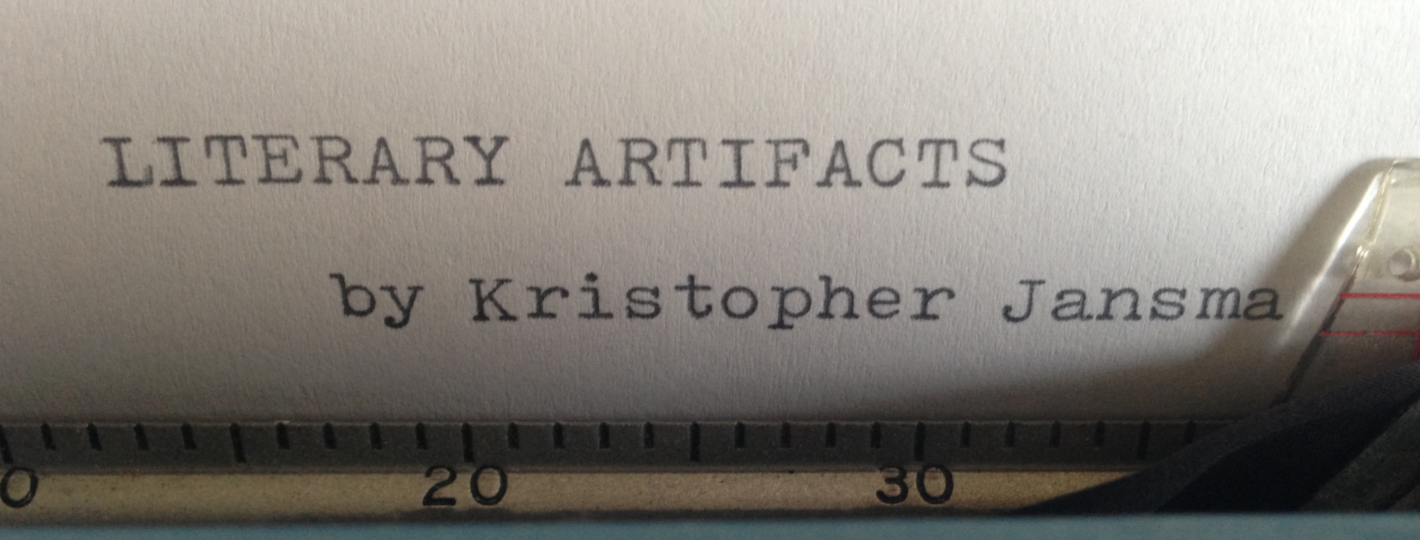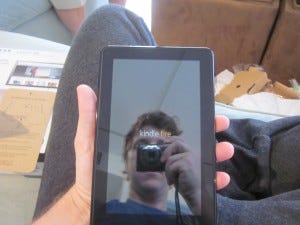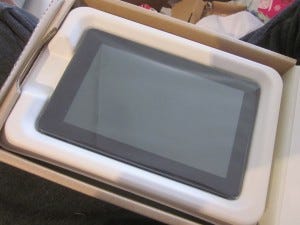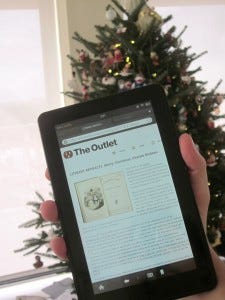Books & Culture
LITERARY ARTIFACTS: How I Learned to Stop Worrying and Love My Kindle Fire


Each month in the Literary Artifacts space, writer Kristopher Jansma writes about his encounters with rare books, writerly memorabilia, and other treasures in New York City and around the world, hoping to discover how the internet age is changing the face of literature as we know it.
On Christmas morning, like five million other people worldwide, I tore the wrapping paper off an innocuous-looking gift only to find a brown box inside with “Kindle Fire” printed along one side. I lifted the lid to find my own face reflected back in a glossy, black rectangle.
Make no mistake, I’d asked for it. I’ve been curious about eReaders since before Amazon began making them — tempted by my desire for a cool gadget that might save me thousands in chiropracty thanks to my tendency to travel with three books at once. Meanwhile, friends teased that I ought to hurry up and finish my novel before printed books went the way of vinyl records. Yes, I’d been eWorrying about eReading even before Nicholas Carr’s article “Is Google Making Us Stupid?” appeared in The Atlantic in 2008, in which Carr examined everything from neuroscience to Nietzsche to explain why electronic reading leads to more distracted, superficial thinking. It was enough to put me off for the next several years.

In the end all it took to get the hook in my mouth was three minutes fiddling with a Kindle Fire owned by my grandmother-in-law. She’d spent Thanksgiving weekend by the Fire: reading a mystery, watching the Twilight Zone, and checking the Facebook page of the kennel where her dog was being boarded. This tiny kennel on a tiny island off the coast of Maine that barely gets cell reception was uploading photos each day of all the dogs in its care and posting them on Facebook so owners could peek in on their pups. Clearly the future had arrived, and I was far behind.
So, on Christmas afternoon, I began fiddling with my new Kindle Fire the way I once tackled the Lego sets of my youth. Ignoring the directions, I quickly set about attaching all the coolest pieces… I gleefully logged into Facebook and Twitter, installed Angry Birds, and watched an episode of Breaking Bad on Netflix. But by lunchtime, I was bored with all that and facing my first real eReading conundrum.
On the flight down for the holidays, I had ploughed through half of David Foster Wallace’s The Pale King, a 560 page hardcover weighing 1.8 pounds in my carry-on luggage. I was already thoroughly tangled in DFW’s taxing taxman novel and I didn’t want to start something new. Though I’d already paid $29.98 for it at my local indie bookseller, my willpower soon broke down. With the press of a virtual button, I had suddenly paid Amazon $14.99 for the convenience of reading the rest on a screen half as heavy as the book I already owned.
I finished the second half of The Pale King during my return flight, on the subway, and in the back of a cab… admittedly less encumbered. Because the Kindle fit in my coat pocket, I could hop in and out of the novel whenever I had a free moment. But I never again found myself as absorbed in it as I had been. Just as Carr had predicted, I found my fingers hovering anxiously to flip the virtual pages.
David Foster Wallace took great pains his writing to envelope readers in a Peoria, Illinois that is not there, to hear voices that are not speaking. Fiction or non, a book tries to coax a reader to become deeply invested in the fates of total strangers, the long dead, and the completely imaginary. An episode of Breaking Bad will progress on its own (so long as Netflix doesn’t go wonky) but a chapter won’t go anywhere unless we exert some energy. Perhaps it just takes some time to learn to tune-out the distractions of eReading, but then again, it also seems like the distractions are half the point.
More than once I got lost in the loops of DFW’s footnotes, which don’t appear at the foot of the eBook pages like in the printed version, but rather awkwardly hyperlink to separate chapters in the end of the file. It got me thinking: could it display Wallace’s notes and marginalia? Diagrams showing how his editors had assembled the unfinished novel? What if you could rearrange the sections on your own? I found myself completely distracted from the content by the possibilities of the form.
Back in June of 2010, acclaimed technology-writer Steven Johnson opined about eBooks in an article called “Yes, People Still Read, but Now It’s Social”. He began by quoting dear DFW, saying in an interview that “The point of books is to combat loneliness.” Johnson argued that this phrase would appear underlined on Kindle because of the “popular highlights” feature, which indicates that other readers had highlighted the passage in their copies. Johnson declared this a breakthrough in socializing reading, and argued it was well worth whatever small distraction it caused. (Interestingly, as of this time the “popular highlights” function is not available on the Kindle Fire, perhaps because some objected to it as an invasion of privacy, or perhaps because some of Amazon’s authors noticed that readers were using the function to highlight typos.)
A style piece, also published in the Times in 2008, offered up another perk of owning an eReader. Austin Considine observed that “burying one’s nose in a book has always been somewhat isolating — with its unspoken assertion that the reader does not want to be disturbed” and says there has always been a stigma about reading alone in public, which is removed by the camouflage of an eReader.
But I for one would rather talk to other readers about what I’m reading than how I’m reading it. I always peek at books people are reading on the subway, but when someone is on their iPad there’s no way of telling if they’re reading Dostoevsky or Sorcery School Sex Tales (*NSFW!*). And while I have never stopped a total stranger to ask if I could play with their Nook, I did recently climb over three children so I could ask a lady reading Swamplandia! if she was enjoying it.

But perhaps Considine had a point. Two years ago, when he wrote his article, I’m not so sure I would have made this same effort. I used to take an encounter with a fellow book-lover for granted, but today, I see them as a comrade-in-arms. Together, with our dead tree books, it feels like we’re taking a stance in a war against their extinction.
Recently, author Jonathan Franzen shared his skeptical thoughts about eBooks, arguing that “serious readers” ought to appreciate the permanence of printed text in an increasingly-transitory world and that a society that loses touch with this is a “radical contingency…not compatible with a system of justice or responsible self-government.”
I quickly posted the article to my Facebook wall. Within minutes an old college friend wrote back: “I hesitate to disagree with someone as great as Jonathan Franzen, but…. [he] is wronger than the wrongest wrong who ever wronged. […] IMO ebooks bring reading to an audience of previous non-readers (i.e. me), and the loss of whatever sense of sacred permanence people got from paper books is not a sign of the apocalypse.. right?”
It was a welcome reminder that, just because the rhetoric has begun to get a little dire, the End of Days are not nigh. There are some who do seem to think that eBooks and print books are locked in some sort of Highlander duel, at the conclusion of which there can be only one… but why shouldn’t people be able to choose to read different things in different ways?
As several more friends jumped in on both sides of the Franzen debate, I found myself thinking again that, two years ago, I would never have been talking this much, to so many people about what reading means to us or to society. Reading might seem like an unavoidably solitary act, but what begins as a private communion with the book and its author, usually becomes a conversation with others. Can you believe George R. R. Martin killed off that character? Have you ever actually finished Infinite Jest? (OK, good, me neither.)
Today, thanks to digital technology, these discussions aren’t restricted to the water-cooler, or trendy cafes and bars. They go on perpetually on Goodreads and Facebook… sometimes involving authors I love, and other times people I’ve never met. In just one hour on Twitter, I learned @ColsonWhitehead’s thoughts about Channing Tatum, heard rumors from @contextual_life that @SalmanRushdie is writing a pilot for Showtime, perused great passages from Irish Literature selected by @The_Millions, and discovered which author was at @McNallyJackson. A friend of mine tweeted a review she found of a short story written by another friend. I posted a link to congratulate a co-worker on winning a poetry prize. I found myself suddenly very interested in the reopening of RiverRun Books, even though it is in New Hampshire (and I am not). Because it isn’t even time for #fridayreads yet and already I feel like I’m part of a movement… we’re not exactly Occupying Wall Street, or in Gertrude Stein’s Salon, but we are living, chattering evidence that people still care deeply about books: physical, electronic, whatever.
Today, I have come to love my Kindle Fire… I use it to check up on literary blogs, and bookish tumblr pages. I read reviews I’ve saved on ReadItLater, and look up the locations of real bookstores on Google Maps. I haven’t yet bought another eBook, partly because I’ve been too busy playing Plants vs. Zombies. But I also happen to be madly in love with my new copy of 1Q84… with its gorgeous cover, delicate dust jacket, and clever formatting, I felt it was well worth the short walk and extra $15 it cost me to get the real thing. It might be 2.8 pounds, and it might take me a little longer to finish because it won’t fit in my coat pocket, but it’s been worth the wait, and the weight. I’ll probably tweet about it later, but if you do spot me reading it on the subway… please, feel free to ask me if I’m enjoying it.
***
— Kristopher Jansma is a writer and teacher living in Manhattan. His debut novel, The Unchangeable Spots of Leopards will be published by Viking Press in 2013. He has studied The Writing Seminars at Johns Hopkins University and has an MFA in Fiction from Columbia University. He is a full-time Lecturer at Manhattanville College and also teaches at SUNY Purchase. Recently, his short story “A Summer Wedding” won 2nd prize in The Blue Mesa Review’s 2011 Fiction Contest, judged by writer Lori Ostlund. His essays and fiction can also be found on The Millions, ASweetLife.org, The 322 Review, Opium Magazine, The Columbia Spectator, and The (Somewhat) Complete Works of Kristopher Jansma. You can also find him on Facebook.









